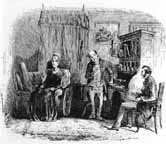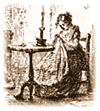
Christmas, as far as I am concerned, is officially here. Why? Because I've got exactly what I asked Santa to bring (by way of my dear, all-too-indulgent husband.) Now, I did require the strength of two coworkers to get my gift to my car tonight (thank you, Ann & Jason,) but then my back is in a bad way. And I am ever so grateful. Truly, I am.
And what did I get? Why the glorious, exquisite, all but perfect (and very heavy) boxed sets of The Nonesuch Dickens! The esteemed publisher, Duckworth, and the resurrected Nonesuch Press, have reissued two sets to date, the second only recently, and today I took both home. The Nonesuch Dickens was originally published in the 1930s and marked the high point of the 20th Century in the reproduction of Charles Dickens' work. These reissues reproduce the beautiful binding, printing and detailed craftsmanship of the originals. They are uniformly big, handsome volumes, with all the original illustrations happily in place, in all their pristine glory, finally to be seen by other than collectors of rare editions.
It's true, in my hoard at home I have already two complete sets of Dickens; my old, reliable, transportable, and frankly ugly Complete Oxford (no longer available, I understand, as a complete set,) and a lovely, if rather bumped and tatty American set from early in the last century. The print -- presumably from old plates -- in the Oxford is troublesome, and the illustrations woefully reproduced in fading, reduced grays. In the older American set, the illustrations are a hodgepodge of a later date than the originals, and while interesting of themselves, are not what Dickens himself commissioned and or approved. I love both of my earlier sets. I will never willingly part with either. But The Nonesuch Dickens is everything they are not; a Rolls Royce to my earlier subcompact and barely repairable -- not to say unhorsed -- landau.

Whatever my other plans might have been for reading over the Holidays (and I do need to reread Breakfast with Scot for the first selection of the Seattle Gay & Lesbian Book Club, starting January!) I am, as I write, eyeing the happy heft of the Nonesuch Martin Chuzzlewit before me on my desk. Such a awesome object, such creamy pages, such lovely endpapers, such legible type! And the illustrations! So clear! So big!
Maybe just a chapter tonight, to ease the pain in my back with a bit of heavy, happy lifting...






 er my shortcomings as a reader, I like to think, as they used to say on the "Society Page" in my little hometown newspaper about any local event other than a funeral, "a good time will be had by all."
er my shortcomings as a reader, I like to think, as they used to say on the "Society Page" in my little hometown newspaper about any local event other than a funeral, "a good time will be had by all."
 probably don't know this second story or dear old Toby "Trotty" Veck at all.
probably don't know this second story or dear old Toby "Trotty" Veck at all.







